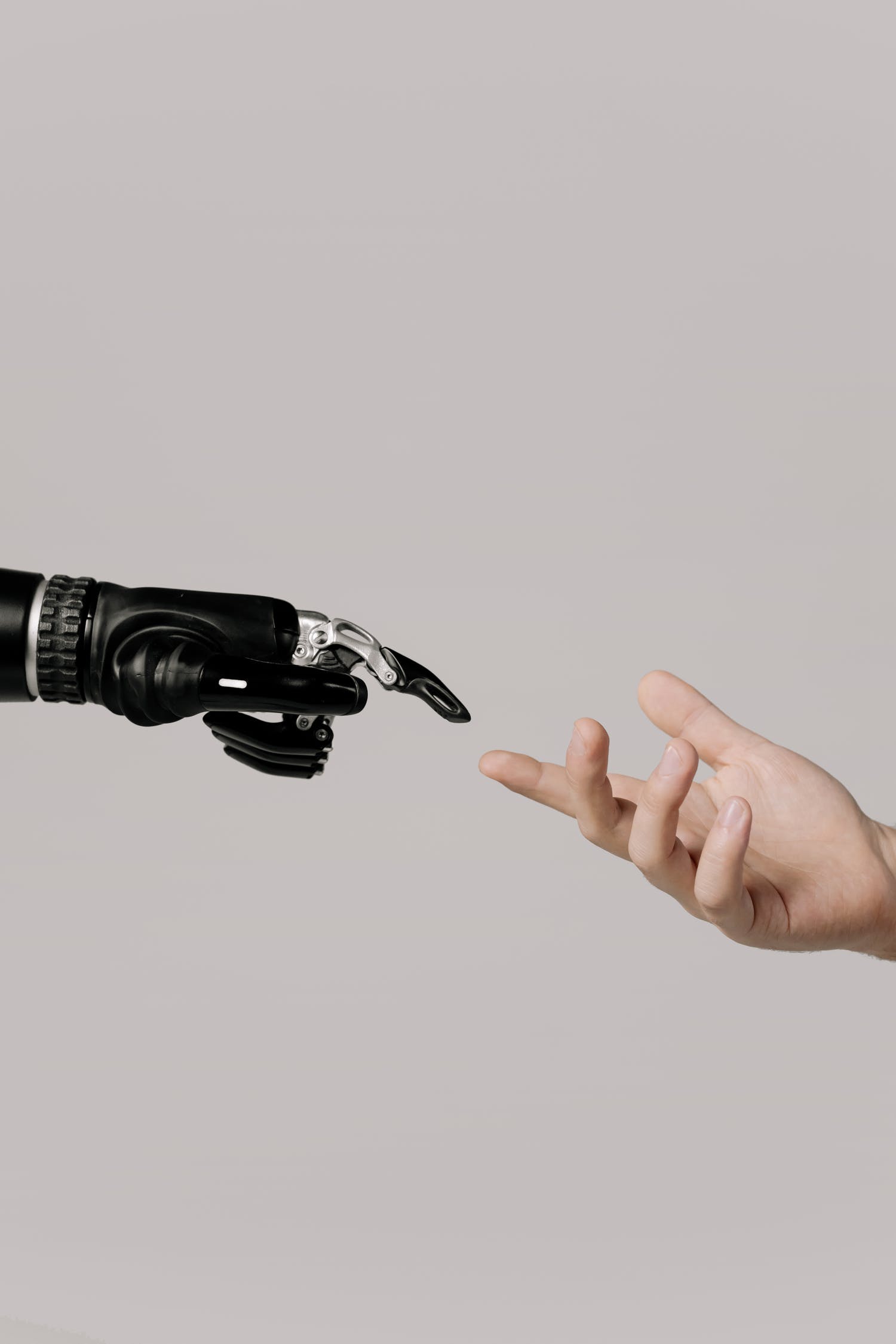
Are you a copywriter or content creator? Do you love where the digital world is at right now and itch to test out the latest online tools to help your creative process? Or are you a little intimidated by the rapid pace at which technology is developing? Wherever you stand, Finesse CEO Jo Caruana’s take on all things writing and tech may interest and even inspire you.
2022 is set to be a busy year on the AI calendar, with a number of global events and conferences taking place in countries as far afield as China, Singapore, Indonesia and Canada. At the start of a New Year that promises its own developments and discoveries, we bring you a writer’s perspective on AI in content creation.
Here, Jo chats with podcast host Trudy Kerr on The Interviewer about life and business following COVID. Read on to see what she has to say about writing, social media and robots – or listen to the podcast for even more juicy insights and a dash of humour!

In a nutshell: who is Jo Caruana?
From actress and producer to writer and editor – with many other roles in between – Jo has had a varied career. But which role defines her best? Jo confides that, at present, she most strongly identifies with that of businesswoman.
Now, more than ever, she is passionate about her own (and other people’s!) businesses and believes in the power and importance of good business. Having said that, she is a multi-passionate soul, and feels that all her other interests play an important part, not only in her personal life, but also in her role of businesswoman.
COVID uncertainty: destination unknown
In spite of all the challenges Jo has faced, both personally and in her business, Jo has come to grips with the new reality born out of COVID. This has shifted her perspective from that of a woman “always looking for a destination”, to that of someone who simply enjoys the journey and is grateful to have new opportunities.
With a new lease on life, she has become open to the possibility of change, and this is what makes her leap out of bed in the morning. She even puts a positive spin on the uncertainty of our day and trusts that “we are just on this magical mystery tour, and we don’t quite know where it’s going to take us!”
Hacking the algorithm: content creation and curation
With a background in journalism, Jo is now in the business of writing and teaching people to write. Yet, she tells Trudy that she still sees the value in social media like TikTok. Why? Because “you can tell a story in a million different ways.” Jo recognises that it takes talent and hours of work to tell a good story on TikTok.
For instance, just as you would come across both high- and poor-quality books and TV shows, you can find content that is both brilliant and rubbish on social media. She believes that if a platform offers engaging output that resonates with users, then it is doing its job as a space that encourages people to use their talents.

Plus, it’s easy for Jo to love TikTok because she has “curated a space of wonder”, where she enjoys watching people share what they’re good at. The trick to finding content you like, she explains, is to curate your algorithm.
Jo apparently learnt this the hard way after inadvertently creating “an algorithm of doom” on Facebook! She admits that, over the years, she has reacted to too much bad news from around the world, and this has brought more bad news to her feed.
The unsettling thing about this is that, by being shown just what we want to be shown, we are locking ourselves into an echo chamber that cuts us off from other content – content that may well be worth our attention.
Artificial Intelligence writing tools: clever or crap?
Jo shares that one of the most interesting developments in writing at the moment is AI. When she tested a particular AI software out for herself, she went into the experiment feeling sceptical – but left quite shaken! It turns out that AI has caught up to the world of content writing and is a lot better than she’d expected.
In Jo’s words: “It’s not crap anymore and it’s getting less crap by the hour.” The scary part is that by Jo’s estimation, a whopping 95% of the content that’s out there now could be created by a robot. How’s that for a shocker?

But how does it work exactly? Well, if you give the software a writing task, the clever little robot trawls the internet, finds the relevant information and puts it together in a new way to generate fresh content. Job done.
Besides writing, some software can even create voiceovers that sound human and repurpose a video clip in hundreds of different ways, within minutes. In the world of human content creation, all these tasks are either costly or time-consuming.
To top it off, Jo refers to a recent conversation she had with a professor at the University of Malta about the jobs that humans will still be able to do as AI gets better and better. Depressingly, the list isn’t very long!
Storytelling: our secret weapon
Thankfully, it isn’t all doom and gloom for us humans who may feel that we are being outwitted by our AI counterparts. Fortunately for us, we still have something up our sleeve that robots have not yet caught up to (although Jo is terrified that, in time, they might!). And that is the “age-old idea of storytelling, and focusing on telling human stories to one another.”
But why does that matter, you may wonder? According to Jo, who is also a StoryBrand Certified Guide, “the art of storytelling is one of the key things we have and share as human beings,” and it is humans who will always be needed to tell a story.

As COVID has shown us, technology certainly helped us through the pandemic by keeping us connected, informed, entertained, and even sane! However, with all that said, it is human contact and communication that we all craved when it was no longer available to us.
As Jo puts it, technology simply “underlined this critical need for that human element in our lives.” She cautions that we should remember this going forward, as it will probably be tested, what with all the developments that are about to come.
The art of writing
The challenge, when it comes to storytelling, is to engage people who are now so “enveloped by content at all times” – with curated content that is tailored to their interests – that it is much harder to capture a reader’s attention. Add to that ever-shorter attention spans and writers have their work cut out for them.
In fact, Jo observes that since many people can only digest tiny snippets of information, they don’t even read full articles anymore, but “headlines at best”. If the stakes are high, this can be downright dangerous. A headline that doesn’t fully represent the text can misguide readers and is, ultimately, “what wins and loses elections, and affects democracy.”
That is the incredible thing about social media and, again, it’s not great – we’re being shown what we want to be shown, so we’re living in this echo chamber of a space that is ours.
But this is where content writing and journalism become more important than ever, and why content creators have to get better at communicating in a way that mass audiences want them to communicate. How can writers achieve this? By honing their craft, Jo says.
“You have to get better at it. You have to know your audience. You have to know who you’re speaking to and what it is they want to read, and just get really good at speaking directly to them in a way that captures their attention. One size does not fit all.”

That is also what sets a writer apart from ‘someone who can write’. A writer – like any successful TikToker, photographer or voice artist – knows that a lot of work goes into writing well and that becoming a better writer is a lifelong process.
Not only are practice and consistent learning key, but so is having the self-awareness to know what you’re good at (and not as good at) as you gradually build your portfolio. Because let’s face it – “you might not be good at writing everything”.
Learning this about yourself as a writer will help you discover your own niche, which Jo reveals is a big thing in the modern writing space. Her advice is to steer away from writing general content and to ask yourself: What is it that I can really bring to the table as a writer?
Jo reassures writers that if you go from writing articles to creating TikTok scripts or bite-sized content for social media, “it doesn’t necessarily make you any less of a writer”. What it does mean is that you are adapting to the times and learning to connect with your audience in a different way. Isn’t that what survival of the fittest is all about, after all?
What’s next? Living with AI
Touching on the subject of AI again, let’s wrap up with this concluding remark from Jo:
“At the end of the day, AI is coming – in a big way. It’s here. It’s going to become a big part of our lives in the same way that the internet became a big part of our lives. I hope we’re ready for it!”
Even COVID, which struck out of nowhere, quickly became our ‘new normal’. Working from home, spending more time with family, and taking advantage of business opportunities online are all benefits we may never have dreamt of before the pandemic hit.
So, if we’ve learnt to live with COVID, are we better off embracing AI than resisting it? We might not have a choice in the matter, and will have to take the good with the bad when the time comes. Just like COVID, the advent of AI is bound to surprise us with new prospects in life and business. Who knows where it will lead us?

If you’re a writer (seasoned or aspiring) who loves their craft and can’t bear the thought of being outsmarted by robots, make 2022 your writing year and join the Finesse Writers’ Club. Stay on top of the writing trends of the future, gain access to a community of fellow writing peers, and learn from top writing professionals through expert coaching – so that you can be the best at what you love doing best! Invest in yourself now and reap the benefits throughout your career. Find out more and sign up here.
Wondering what we’ve missed from the interview? Tune into the podcast where Jo talks about all of the below and more!
- Does Jo live on a boat?
- What is it really like to work in theatre and to be part of a popular, long-running comedy production like the Comedy Knights?
- Has she faced any threats as an outspoken woman in Malta’s public eye?
- Is she ever going to write a book?
Listen till the end to hear how COVID affected her on a personal level, and what she did to come out of the dark place she found herself in (hint: it involves learning).
Subscribe to our free newsletter
We help you finesse your business, serve your customers best and achieve more success.

